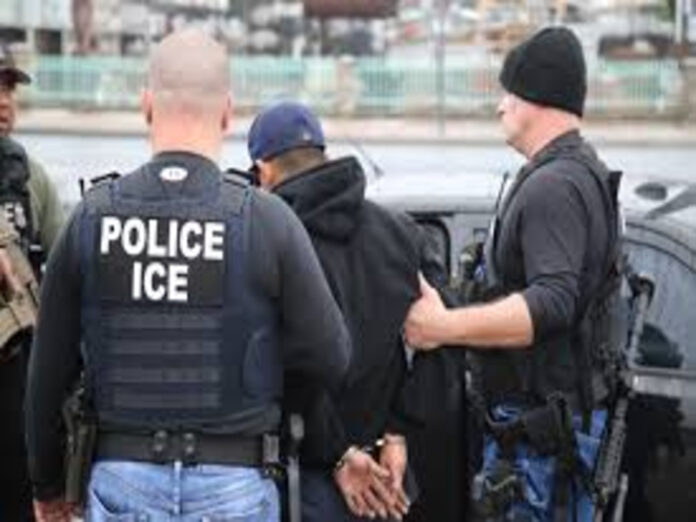Agents Demand An End To Anti-ICE Enforcement Rhetoric
Wednesday, October 15, 2025, 2:00 P.M. ET. 4 Minute Read, By Jennifer Hodges: Englebrook Independent News,
WASHINGTON, DC.- The U.S. Department of Homeland Security (DHS) has confirmed that Mexican drug cartels are now offering tiered cash bounties on federal immigration officers, including ICE, Customs and Border Protection (CBP), and Border Patrol agents.
The revelation, verified by federal intelligence sources and confirmed in recent DHS bulletins, has sent shockwaves through the law enforcement community.
Under this cartel-issued bounty system, violence has been monetized:
- $2,000 for doxxing an agent or identifying family members.
- $5,000–$10,000 for kidnapping or physical assault.
- Up to $50,000 for assassinating senior ICE or CBP officials.
In one Chicago case, a suspected cartel affiliate allegedly placed a bounty on a Federal Enforcement Commander, Greg Bovino, who is overseeing multiple Midwest operations. DHS officials say these bounties reflect “a coordinated campaign to intimidate and terrorize U.S. officers on American soil.”
“These are not random acts of violence,” one DHS spokesperson said. “They’re deliberate attacks designed to undermine law enforcement, spread fear, and weaken U.S. border security.”
The Human Toll Behind the Headlines;
For the agents who enforce immigration and customs laws, this is not abstract policy; it’s personal. Many live in small border communities where anonymity is impossible, and now their families are at risk.
Federal officers already work under strain, facing long shifts and dangerous terrain. The introduction of bounties adds a chilling new layer: fear that their next assignment could make them a marked target.
DHS has ordered immediate protective measures, including inter-agency coordination with the FBI and U.S. Marshals Service. The department has also warned state and local authorities to remain alert to potential cartel-linked threats within their jurisdictions.
Political Rhetoric and Real-World Consequences;
While cartels escalate violence, the political conversation surrounding ICE and immigration enforcement has become increasingly toxic. Over the past several years, some Democratic leaders, governors, mayors, and members of Congress have branded ICE as “authoritarian,” “racist,” or “Gestapo-like.”
Their words, law enforcement advocates say, have consequences.
“When elected officials demonize ICE agents, they feed into the narrative that these men and women are villains,” said a retired Homeland Security Investigations supervisor. “That rhetoric emboldens extremists and cartels alike.”
DHS itself has warned that political “dehumanization of law enforcement” risks inspiring violent action. Senator Chuck Grassley (R-IA) recently called on Congress to “unequivocally condemn hateful left-wing rhetoric toward the men and women who enforce our immigration laws.”
Even within the Democratic Party, a growing number of moderates are urging restraint, arguing that criticism of immigration policy must not translate into hostility toward the individuals carrying it out.
Five Urgent Actions Needed;
- Full Federal Protection:
DHS, FBI, and U.S. Marshals should classify cartel bounty operations as domestic terrorism and deploy immediate counter-threat teams. - Maximum Enforcement of Threat Laws:
Online harassment, doxxing, or incitement targeting federal agents must be prosecuted aggressively under existing statutes. - Political Accountability:
Governors and lawmakers must publicly retract language that vilifies federal officers and contributes to a climate of hostility. - Responsible Media Coverage:
Journalists must frame this story as a national security crisis, not a partisan issue, and avoid sensationalism that could further endanger officers. - Bipartisan Unity:
Lawmakers of both parties should reaffirm their commitment to protecting law enforcement and the rule of law.
A Crisis That Crosses Party Lines;
This is not about immigration ideology; it is about national sovereignty and basic safety. When drug cartels place dollar-amount bounties on federal agents, the line between crime and warfare blurs. And when political leaders continue to vilify those very agents, it sends a dangerous message: that defending America’s borders is somehow indefensible.
Rhetoric has power. And when that power fuels real-world violence, it becomes complicity.
The bounties, DHS warns, represent a direct assault on the authority of the United States government.
Stopping them and the words that encourage them is no longer optional. It’s imperative.
Editor’s Note;
This article is based on verified reports and public statements from the U.S. Department of Homeland Security and other credible law enforcement sources. It reflects the reality of escalating threats to federal immigration officers and calls for restraint in political discourse surrounding law enforcement. The piece advocates no party line but underscores a bipartisan responsibility to safeguard the men and women who uphold U.S. law.

